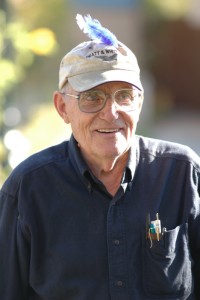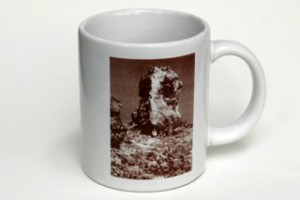Yesterday we buried George Billings, and now my neighbors are wondering how and when we’ll ever get together again. Turns out the street’s senior resident was more than just a wrangler of trashcans; he was our community organizer.
A lifelong bachelor, George lived alone in a house several doors down from mine—well beyond my regular social circle. Yet he and I became well acquainted, thanks largely to Tuesday morning trash pick-ups. Since most homeowners are away during the day, George assigned himself the task of retrieving emptied cans from the street and returning them to their respective back yards and driveways. And because I work from home, and because George was 92 years of age, I tried hard to get to my can before he could.
“Please, George,” I explained, “I don’t want you to have a seizure in my driveway!”
George laughed it off, but fact is, back in December he did collapse on Phyllis’s curb. “Everything went black,” he explained. “But I was able to gather myself up and crawl home before anyone could call an ambulance.”
That episode was the latest of several health setbacks in recent years and the one that convinced him it was time to relocate to an assisted living center, where I’m told he quickly became friends with everyone within hobbling distance. A few days after Christmas he called to inform me of his new address, and I was planning to visit him there when word came that he had died—while attending a funeral, no less.
George had attended many funerals in his lifetime, always volunteering to lead the congregation in singing “Nearer My God To Thee.” Come to find out George had sung tenor in several church choirs, was a member of the Utah Oratorical Society, and knew every word and note of Handel’s “Messiah” by heart. Prior to his funeral, I hadn’t known about his musical background, since I never attend church and because mostly our trash day conversations centered upon George’s Dickensian upbringing on a farm in Millard County, where he was the fifth of eleven children. So crowded was the Billings farmhouse that George slept in the barn with the livestock. Following graduation from Delta high school, he was drafted into the Army. After being honorably discharged, he served a Mormon mission to western Canada. In Salt Lake City, he’d worked at a hardware store, a paint store, a music store and for the U.S. Postal Service.
At some point in his past he’d been excommunicated, the result of having confessed to a sin of some sort to an unforgiving bishop. George never told me the exact nature of the sin, so I can only speculate. What I can say for certain is that his banishment was a huge mistake and one that was wisely lifted by a subsequent bishop, after which George became more than just a member in good standing, but a virtual “rock star” in the Wasatch Ward.
Knowing that I, too, am a former Mormon currently residing in outer darkness, George would from time to time draw me back into the fold. Although I never took the bait, I always appreciated the gesture, because I understand his intentions were good. George Billings merely wanted to do that which to his way of thinking was the right thing to do. At his funeral I learned of many kindnesses he’d performed during the course of a long lifetime—trashcan retrieval being merely the tip of the proverbial iceberg. Turns out just about everyone in his orbit has been gifted—not only by his friendship but by an item he’d carefully chosen as just the right thing. In my case, it’s a coffee mug featuring a Millard County land form supposedly shaped by nature to resemble the profile of Mormon Church founder Joseph Smith. I cherish it—not because it reminds me of Joseph Smith but because it reminds me of George Billings.

